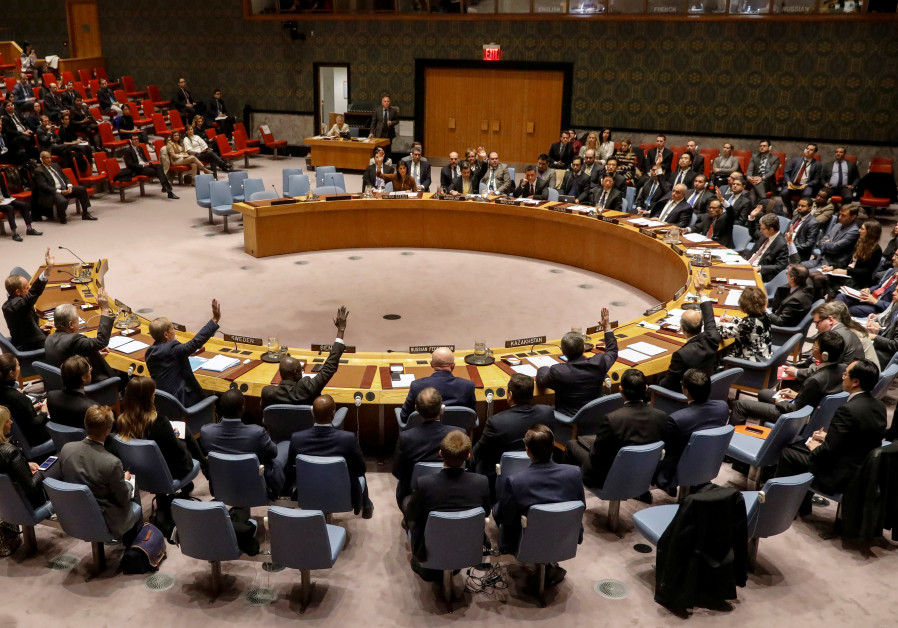WATCH: European envoys warn Israel: Khan al-Ahmar demolition violates UNSC

The United Nations Security Council votes, November 17, 2017. (photo credit: REUTERS)
The countries, all of whom are current, past and future UNSC members, read out a joint statement in New York on Thursday prior to a council monthly debate on the Israeli-Palestinian conflict.
Ambassadors from France, Poland, Sweden, the United Kingdom, the Netherlands, Belgium, Germany and Italy stood together to speak to reporters.
The EU, they said, has “repeatedly stated our long-standing position on Israel’s settlement policy, illegal under international law, as reconfirmed by Security Council Resolution 2334 (2016), and actions taken in that context, including the demolitions of Palestinian communities and possible forced transfers of population.
“The community of Khan al-Ahmar is located in a sensitive location in Area C, of strategic importance for preserving the contiguity of a future Palestinian state.
“The consequences of a demolition of this community and the displacement of its residents, including children, would be very serious and would severely threaten the viability of the two-state solution and undermine prospects for peace,” the envoys stated.
“We therefore call upon the Israeli authorities to reconsider their decision to demolish Khan al-Ahmar,” the envoys said.
Both the European Union as a body and its individual member states have long stood in solidarity with the Bedouin village of 180 people that was illegally constructed off of Route 1, just below the Kfar Adumim settlement.
The state wants to relocate the Bedouin to a new neighborhood of Abu Dis, called Jahalin West. The Khan al-Ahmar residents, want the Higher Planning Council for Judea and Samaria to authorize their village of tents and shacks in its current location.
The High Court of Justice earlier this month ruled that there was no legal impediment to the relocation of village’s evacuation, but the state has yet to take action against it.
Earlier this month the European Parliament passed a resolution that called on Israel not to evacuate the village warning that such an act would be considered a war crime.
Members of the European Parliament’s delegation to Palestine visited Khan al-Ahmar on Wednesday. The United Kingdom’s Minister for the Middle East Alistair Burt visited Khan al-Ahmar in May and July.
British Foreign Minister Jeremy Hunt this month wrote of his opposition to the Khan al-Ahmar demolition in a letter to a member of the British Parliament earlier this month, that was then distributed to the media.
UNSC members and UN Special Coordinator to the Middle East Peace Process also spoke out against the move at Thursday’s Security Council meeting.
Opponents fear that once Khan al-Ahmar is relocated the state will force other Jahalin Bedouin to leave their encampments in the area.
Khan al-Ahmar residents are member of the Abu Dahuk clan of Jahalin Bedouin forced by Israel to relocate to the West Bank in the early 1950s, when the region was under Jordanian control.
They settled in the region of the Jerusalem Jericho corridor, with photographic and ariel evidence placing them at the location of the current village as far back as the 1970s and 1980s.
There is common consensus that the debate over where Khan al-Ahmar should be located is heavily mixed with politics and the strategic long term vision for the Jerusalem Jericho corridor.
Israel holds that it is vitally important for that area to remain under its control, arguing that the opposition to the Khan al-Ahmar relocation stems from the Palestinian Authority’s desire to ensure that it control the area.
The Palestinians have been blunt about their view that this is part of the land battle for the future boundaries of their state. Khan al-Ahmar residents and their supporters have held Palestinian flags during protests and have placed them on the outskirts of the village overlooking Route 1.
In a letter to European Parliamentarians Khan al-Ahmar spokesperson Eid Abu Khamis Jahalin wrote, “We want to stay where we are or go back to our lands in the Negev Desert, which our family was forced out of by Israel in 1952.
“We love living in desert and we don’t want to give up our Bedouin culture, our animals, our way of life, to have to go and live in a town — next to a garbage dump — or next to a sewage plant.
“We’re not stupid or backwards. We know exactly what we want. We want to choose for ourselves as free citizens. Why should some else’s army continue to decide for me who I am? What’s good for me and my future?
“I think if we have to go by force, it will mean a lot of many other people. If they demolish our community and school, and no one stops them, they’ll start transferring into relocation sites all Bedouin communities from other tribes across the West Bank. And we know that will also mean we say goodbye to peace or a Palestinian state,” Khamis Jahalin said.
Join Jerusalem Post Premium Plus now for just $5 and upgrade your experience with an ads-free website and exclusive content. Click here>>






Comments are closed.